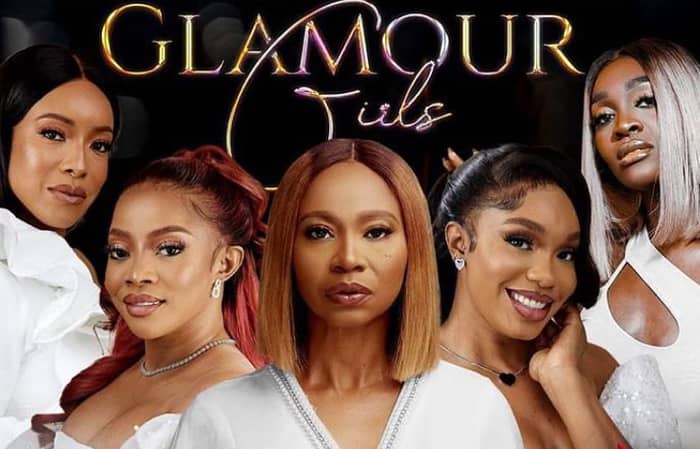by Akinwande Jordan.
The past should sometimes remain in the past” -is what I would say if they ever let me into a Netflix pitch meeting involving a Nigerian movie. In this epoch of reboots and remakes, perhaps it’s time for us to critically question whether or not we are allergic to originality or at the very least a decent film. I sat down to watch Netflix’s remake of Glamour Girls (1994) and those two arduous hours reaffirmed my theory – A lot of the major Nigerian filmmakers do not care about their art or maybe they do and they just don’t know how to show it.

A rule of thumb when writing a film review is providing a digestible synopsis but an exception has to be made here as there seems to be no coherent plot, although not intentionally. There are allusions to the original film with character cameos and the premise of high-end escorts navigating the perils of their occupation but for the most part, there’s no sense of direction. It feels like a film striving to be taken seriously but failing at upholding the many tenets that are imperative in storytelling. The only decent performances were Nse-Ekpe Etim and Sharon Ooja, and that’s not saying much due to the fact that it’s a star-studded film. The glamorous locations are there (pun definitely intended) and the actors… are acting. However, there’s a quality problem and that problem isn’t peculiar to just Glamour Girls as a film, but to the whole of Nollywood. Although this is a different kind of quality problem peculiar to Netflix Naija, an arm of a streaming service that has enabled this slightly below-average form of storytelling in recent times and will continue to do so.
In the days before streaming, Nollywood had some semblance of substance in the stories despite the constant repetition. Making a film was a herculean task for most filmmakers, so they had to make one film and split it into a trilogy or quadrilogy just to boost sales. That affected the quality of stories but you could tell that someone cared enough to tell a proper story. Be it the dotty-eyed poor hero falling for a rich girl; to comment on the communal class divide via the resistance of her parents, or an innocent school boy being lured into violent fraternities; to shed light on how the purest of people can embrace the darkness that the world offers – There was an actual story to tell.
The advent of Netflix NG was supposed to be a saving grace for those stories in terms of accessibility and originality. It was supposed to save a highly saturated market from totally becoming financial machinery devoid of care and artistic gravitas, but so far they’ve done more damage than good to the industry, with the recycling of actors and the Third Mainland Bridge as a transitory shot between scenes (please leave that bridge alone, we get it you own drones). Films like Glamour girls, the not-so-slightly sexist Namaste Wahala, and Merry Men (I apologise but this film is a war crime, and arrests should be made) are getting funding in place of real stories with didactic cores. Perhaps the filmmakers who make these films assume that we are numb to blandness, and therefore we cannot engage with media that challenges our philosophy and beliefs. We are not asking for a Spielberg-Esque film or something reminiscent of Martin Scorcese or maybe we are – would that be so bad? To watch something that doesn’t make you feel empty.
There is always going to be a market for fun films, bad films, and experimental films. There’s a market for everything and we should not shy away from diversifying and looking for complex stories that challenge cultural status quo and sociopolitical standards or simple stories done well, done with intentionality. Cinema is supposed to take the top of your head off and hit you in the gut but we are being fed with mediocrity and its sequels. We have the talent to complement the many great stories we could tell. We can make great cinema.
Glamour Girls is just one film in the array of films that Netflix Naija will produce this year and although it might be too hasty to make speculations one should not hope for anything groundbreaking in their timetable. They are a streaming service after all and when it’s all said and done the bottom line at the fourth quarter of the financial year is all that matters to them. Production over purpose. They know the audience will take it despite feeling they deserve better. I can only hope that they someday channel the resources into looking for people who have beautiful stories to tell. People who care about film as a medium of artistic expression. We should all be able to sit down in front of our screens and know that when we hear that brief sound before a Netflix movie starts, we are not about to have our intelligence insulted by a bad plot or exotic locations and subpar dialogue, we should be able to expect something that is at the very least decent.





